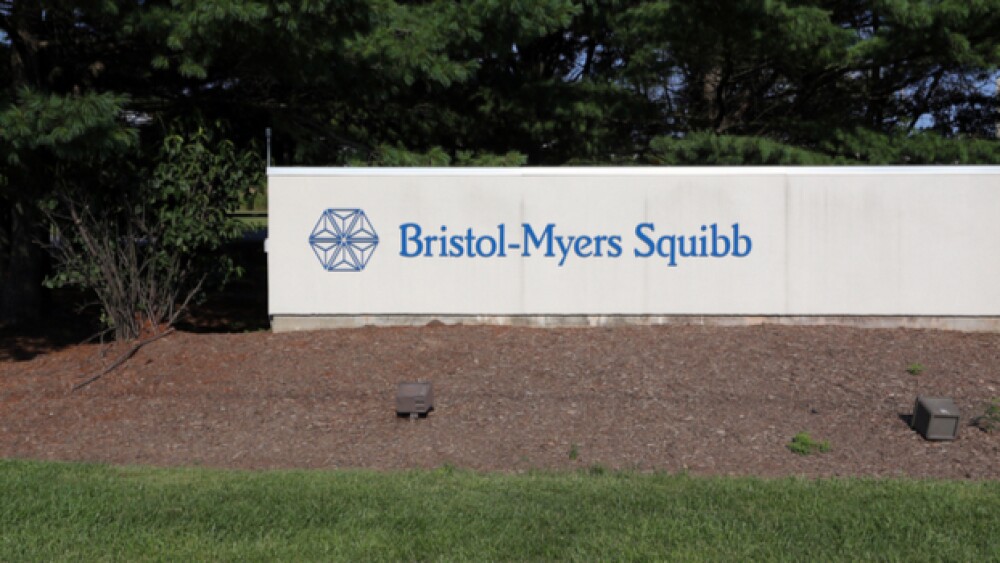Shares of Bristol-Myers Squibb are up slightly this morning after the proposed $74 billion acquisition of Celgene gained some significant support over the weekend. That support has caused at least one opposition group to withdraw from the fight.
Katherine Welles / Shutterstock.com
Shares of Bristol-Myers Squibb are up slightly this morning after the proposed $74 billion acquisition of Celgene gained some significant support over the weekend. That support has caused at least one opposition group to withdraw from the fight.
On Friday, Proxy investment firm Institutional Shareholder Services threw its support behind the proposed acquisition and recommended that shareholders support the deal at the April 12 vote. ISS said the proposed deal “has sound strategic rationale” and added that “the valuation appears reasonable.” Also taking a stand in support of the deal over the weekend was proxy advisory firm Glass Lewis & Co.
“Based on our research, review and analysis, we believe the proposed merger is strategically compelling and presents the opportunity for potentially significant returns to shareholders of the combined company, including existing Bristol-Myers holders,” Glass Lewis said in its statement of support. “In particular, the merger represents an attractive, risk-adjusted opportunity to enhance Bristol-Myers’ product portfolio by leveraging Celgene’s current ‘Big Five’ late-stage, near-term product launches to significantly enhance Bristol-Myers’ pipeline, thereby placing the company in a strong position to supplement and eventually replace the revenues currently generated by Bristol-Myers’ existing products.”
After ISS and Glass Lewis came out in support of the deal, Starboard Value LP, one of the earliest shareholder groups to raise concerns about the deal, said it was “extremely disappointed” by the conclusions the two proxy advisory firms made. In a brief statement issued over the weekend, Starboard Value said it continues to believe that the proposed deal between BMS and Celgene is “a bad deal for shareholders that carries too much risk.” Starboard said it will vote against the proposed acquisition but noted that because of the “substantial swell of support” for the deal, it would be difficult to defeat given the support from ISS and Glass Lewis.
“Therefore, Starboard has decided to withdraw its proxy solicitation to vote against the Celgene transaction. However, if shareholders want to protect and save Bristol-Myers, they can still vote against the company’s proposed acquisition of Celgene on the company’s white proxy card,” Starboard said in its announcement.
While Starboard is tossing in the towel in its month-long fight against the BMS/ Celgene deal, Wellington Management Company LLP, which owns about an 8 percent stake in BMS, remains committed to fighting the deal. When Wellington first announced its opposition, the firm said it believes BMS should be active in business development that involved mergers and acquisitions but added that it does not believe the Celgene deal “is an attractive path towards accomplishing this goal.”
Wellington said the transaction asks BMS shareholders to accept too much risk and also disagreed with the terms offered to Celgene stockholders. If the merger is completed, Celgene stockholders immediately prior to the completion of the merger will be entitled to receive $50 in cash, one share of Bristol-Myers Squibb common stock and one contingent value right for each share of Celgene common stock held by them.
Since announcing the proposed acquisition in January, BMS leadership has spiritedly laid the groundwork for the reasons why management believes the deal is a good one. The BS board of directors issued an open letter to shareholders urging them to support the deal and outlined the reasons why they should do so. BMS Chief Executive Officer Giovanni Caforio has also stressed the importance of the deal for the company on multiple occasions. Caforio said the deal will create “the number one oncology franchise” for both solid and hematologic tumors. Caforio said the pillars of the combined pipeline will be built on the blockbuster checkpoint inhibitor Opdivo, as well as Yervoy and Celgene’s powerhouse drugs, Revlimid and Pomalyst. Caforio said the deal “is the right option and the best option for Bristol-Myers Squibb.” In March, the company outlined the advantages of the deal, citing four specific points. They included growing a stronger commercial presence in the company’s key disease franchises, launching “exciting new medicines,” including six in the near future, advancing a significantly enhanced early-stage pipeline, and integrating a range of R&D modalities to strengthen the pipeline.
The vote is set for April 12.





